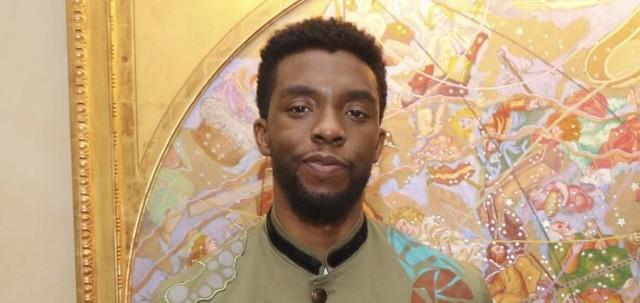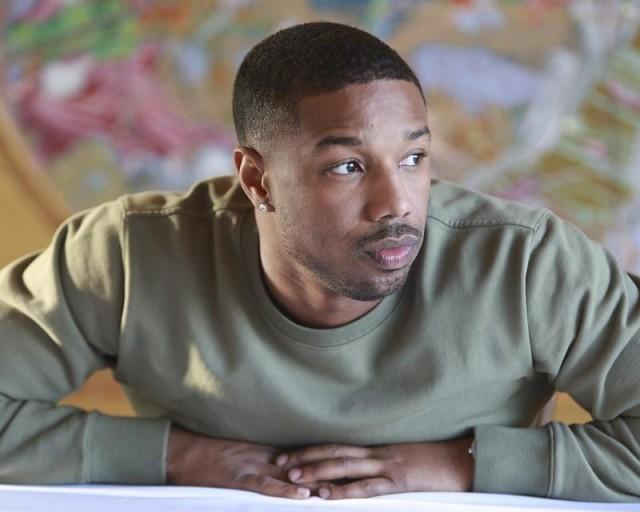Eye to eye with a Black Panther and his friends
Los Angeles — The purple carpet premiere of the Ryan Coogler-helmed film, “The Black Panther,” was quite the celebratory event as cast, crew and some guests walked the purple carpet in African-inspired outfits at The Dolby Theater in Los Angeles.
READ: Stars dazzled on the purple carpet of Black Panther's premiere night
This is the first Marvel film to feature a black superhero in a titular role; it stars Chadwick Boseman, who portrays the Black Panther.
Showing full support for a movie that was a celebration of black excellence were his co-stars: Lupita Nyong’o, Michael Jordan, Daniel Kaluuya, among others.
The movie picks up where that “Civil War” left off, following T’Challa or Black Panther, who after the death of his father, the king of Wakanda, returns home to assume the throne.
We talked to the cast and the director one sunny Tuesday afternoon, a day after the premiere, at the Montage hotel in Beverly Hills. Below are excerpts of our conversation with this talented group.
Chadwick Boseman (T’Challa/Black Panther)

On what it means to have this movie come out at this time: It’s a great time for this movie to happen for various reasons. It’s a black cast, a black superhero on this stage. It’s the 18th movie in the Marvel cinematic universe and the studio threw everything they could into it. They got this director and put this cast behind it. It says everything.
On the importance of being vocal about social and political issues: I feel like it’s important at times to do it. I view myself as an artist, and I feel like my art at times is activism. Sometimes it’s important for you to speak out separate from that, and sometimes it’s important that your work speaks for itself. I think you have to be very mindful of when to do that and when you should do it, because the more important thing is, on what stage is the activism most useful? Sometimes it is more useful for people to see you step outside of your artistry and at all costs, make a statement whether it’s going to hurt your box office or not. There are certain moments where you should do that.
Lupita Nyong’o (Nakia)

On what it means to have this movie come out at this time: I think art, when done well, is relevant in more than one time. We started making this film at a very different time in America’s political history or present. Now, it’s reflecting in a way that feels so poignant.
Our director, Ryan, was off to something then, something that is true in more than one epic. This is something that is going to resonate around the world. We are always dealing with questions of where [we] belong in different ways and who are my people, and who do I answer to? So I am excited to be on this film right now with this cast at this time, when people can talk about it, and hopefully it sparks conversations that people are having internally and within their little cohorts. But now, we can perhaps have a wider conversation in our popular culture about what is important.
On showing powerful and strong women in film: The power of cinema is that it can show you the world as it was, as it is and as it could be. Wakanda is what it could be. Because Wakanda is a society where men and women are both participating in the future and the building of the nation equally, and so we see a society that is fully realizing the full potential of its citizens. To see it in a manner where neither sex is threatening the power of the other is so powerful, because it looks logical to me. So it’s an opportunity for us to see something to be inspired and create that. It is a possibility. It is actually possible where we are not pitted against each other and me assuming my power does not mean the diminishing of yours.
On her feminist father: My father is a feminist man. Even if a man does not ascribe to the term feminism, they can exercise feminist thoughts without having to ascribe to that term, because that term in itself has been politicized. It’s often misused and stuff. But my father is a feminist.
He raised four daughters and he didn’t raise them any differently than he raised his son. My parents raised us to realize our full potential. They raised us to tap into what our purpose is on this Earth and what brings us joy, because what brings us joy is probably what our purpose is and to make a living out of that. To live on purpose. He did that with the boys and he did that with the girls. My brother was raised to cry when he wants, as much as we were. My father never said “be a man” to my brother. So I have a brother who is able to express himself and not feel emasculated by doing so. My father is my first and most important male feminist.
Michael B. Jordan (Erik Killmonger)

On what he hopes the enlightenment of the movie will be for kids: I wanted to do this movie for my 10-year-old self. I wanted to do this film because I know what it was like watching cartoons and movies. I had to really imagine myself in these heroic roles because they didn’t look like me. I used to imagine what it would be like if I could actually see someone that looks like myself in these characters, how inspiring that would be for me, that I can do anything; that I can achieve these powerful, successful roles.
I feel like this film hits it on every level; with African history, ancestry, royalty, and these positive strong female characters. I feel like these kids growing up will see that of themselves, those examples. It inspires them of what they’re capable of whether it be fantasy or not. It’s something that they can achieve at the highest level. That’s super important.
Daniel Kaluuya (W’Kabi)

On what is celebratory about “Black Panther” for him: It's an African superhero movie. It's amazing, like 19% of the cast is speaking in an African accent including Andy Serkis. To see your culture in that kind of space is an amazing feeling. A lot of characters are speaking like my uncles and my aunts.
On his aspirations and how he envisions himself five years from now: Lucky the breakthrough came before I even shot “Get Out.” There's stuff I want to say and there's stuff I want to help people say. I see acting as me helping someone say something so I want to continue doing work that I believe in and work that empowers the marginalist.
In five years, I like being able to help people who wouldn't get that opportunity to tell their stories from different perspectives no matter what. There's a film called “Metro Manila.” It's about the Philippines. It's an amazing film. Now you realize I love learning about the world. That's why I watch a lot of documentaries because you learn something new from a different culture. So whatever platform I've got, I want to use that leverage to empower others because a lot of times, they don't have the tools to grow. I want to keep telling stories that have something to say.
Director Ryan Coogler

On the pressure he felt while making this film: That pressure is real. What I try to always do is keep it as a source of motivation. Then after that, I just try to tune it out because if you think about it too much, it would make it impossible for you to do your best work. You can't focus in on the details of the work.
On the idea of making a movie about black identity: One of the things that I thought about for this film was, what it means to be African. What does that mean? That question was something that motivated all the decision-making that went into the film for me. It is a film that deals with identity. It deals with the concept of tradition.
You mentioned is this a black film. It's another word for somebody of African descent and I'm sure you have words for those concepts. What does it mean? That's a question that anybody could ask themselves even with their own heritage. This is a question anybody could take on. What does it mean to be Chinese? What does it mean to be German? What does it mean to be from the Philippines? What effect does that have on me as a person? What effect does that have on me in terms of where I'm going and how the world views me? So all of those things went into play with the film. — LA, GMA News




